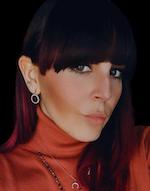In March, our Auto / Bio / Fiction series of talks and seminars welcomes Lorenzo Marchese and Julia Kritsikokas.
9 March 2023, 17:30 UTC (online)
Lorenzo Marchese, “A Brief History of Italian Autofiction”
 In this talk, I will sketch a brief history of Italian autofiction in the last thirty years, focusing on two main examples: Walter Siti (1947) and Giulio Mozzi (1960).
In this talk, I will sketch a brief history of Italian autofiction in the last thirty years, focusing on two main examples: Walter Siti (1947) and Giulio Mozzi (1960).
It is known that ‘autofiction’ is a French neologism, invented by a literary critic, Serge Doubrovsky, in order to present his debut novel Fils (1977). Doubrovsky’s artistic proposition starts from the theoretical distinctions between novel and autobiography by Philippe Lejeune in Le pacte autobiographique (The Autobiographical Pact, 1975) and aims at a creative breach of the traditional language of autobiography, not too differently from what Roland Barthes does from a very different side in his essayistic, pseudo-autobiographical book Roland Barthes (1975). In both authors, the result is a paradoxical novel where the author, the narrator and the main character apparently correspond, yet the autobiographical model is explicitly shaped in the direction of fiction. In spite of the fact that this category was initially widespread in French and English literature, a so-called ‘archaeology’ of Italian autofiction (even if it was not called with this term) can be detected in novels and illusive non-fiction writings by Mario Soldati, Curzio Malaparte and Guido Piovene. Nevertheless, in the last thirty years an autofictional production has sprung in Italy along with a huge critical debate. Among many possible names, we can mention authors such as Rino Genovese (Cuba falso diario, 1993), Tiziano Scarpa (Kamikaze d’Occidente, 2003), Giuseppe Genna (Dies irae, 2006), Antonio Scurati (Il bambino che sognava la fine del mondo, 2008), Michele Mari (Leggenda privata, 2017), Andrea Tarabbia (Il continente bianco, 2022).
In all of these novels, fictional life-writing acquires several, illusive forms: it can look like a strictly realistic memoir and base itself on the unreliability of the narrator, or otherwise include fantastic features that take us away from referentiality; it can also manipulate a wide range of well-established literary genres of the self (autobiography, ghost-story, lyric poetry, testimony, ‘roman à clef’ and so on). In my intervention I will try to highlight some of the narrative issues in autofiction through the examination of selected excerpts from Il dio impossibile (2014: this trilogy collects Scuola di nudo, 1994, Un dolore normale, 1999, Troppi paradisi, 2006) by Walter Siti and Il male naturale (1998) by Giulio Mozzi.
Julia Kritsikokas, “The Writing of Trauma in French Women’s Autofiction: Annie Ernaux and Nina Yargekov”
 For over thirty years, autofiction has been the main form adopted in self-narrative experiments in France. By considering the possibility of subjects fictionalising their life experience, Lejeune de facto opened the autofictional space with his Le pacte autobiographique in 1975. Continuing to the present day, the debate on the genre of autofiction is still open and rich in perspectives. Women’s writing has given important contributions to this genre, offering some of the most distinctive autofictional narratives in literary landscape.
For over thirty years, autofiction has been the main form adopted in self-narrative experiments in France. By considering the possibility of subjects fictionalising their life experience, Lejeune de facto opened the autofictional space with his Le pacte autobiographique in 1975. Continuing to the present day, the debate on the genre of autofiction is still open and rich in perspectives. Women’s writing has given important contributions to this genre, offering some of the most distinctive autofictional narratives in literary landscape.
Self-narrative in French female authors hosts a huge range of issues and topics, that are quite difficult to explore. In my contribution I shall discuss how autofiction is fertile ground for the narration of trauma. The combination of real events and fictional elements allows the practitioners of the genre to respond to difficult issues through literary language. The genre of autofiction perfectly embodies the constant tension between laceration and cure. With the expressive tools provided by self-imagination, what cannot be said directly about one’s own experience finds its way into fiction.
In this presentation, I will talk about the two particular cases of Annie Ernaux and Nina Yargekov. The former is a widely recognized, crucial writer who in her writings breaks out of the autofictional genre itself. Her stories are not mere autobiographical tales or even personal memoirs. Instead, Ernaux aims to create and give back a shared narrative as close to reality as possible, a self that is no longer merely personal but collective, and therefore political. In particular, I will focus on the novel L’événement which is about the traumatic experience of abortion. The latter is a French-Hungarian novelist who makes parody and pastiche the main stylistic feature of her writing. Yargekov adopts a new, critical perspective on the main self-narrative genres in her novels and interprets the reality around her on the basis of her own, multidisciplinary readings (judicial, advertising, economic, political, psychoanalysis texts, etc.). In this case, I will focus on her debut novel Vous serez mes témoins (2011) which deals with the trauma of a friend’s suicide.
Attendance is free but booking is required to receive a link to attend. REGISTRATION IS NOW CLOSED.
Watch the video of the seminar:
The speakers:
Lorenzo Marchese is Assistant Professor in comparative literature at University of Palermo with a research project on potentialities and boundaries of ecocriticism. Previously he taught and researched in both contemporary Italian literature and comparative literature at the universities of L’Aquila and Chieti-Pescara. He also worked as editorial consultant for the tv and movie production company Cattleya (2016-2017) and sporadically as a translator from English and French into Italian (for publishing houses as Bompiani and Minimum Fax). He has published L’io possibile. L’autofiction come paradosso del romanzo contemporaneo (Transeuropa, 2014) and Storiografie parallele. Cos’è la non-fiction? (Quodlibet, 2019), both inquiring from different perspectives the theoretical challenges of factual and pseucofactual fiction. Besides his interest in the intersections of historical narrative and fictional discourse in modern literature, his research focuses on the philosophical aims of narrative (especially the novel-essay), critical readings of poetry and prose in contemporary Italian literature (especially Primo Levi, Cesare Pavese, Rocco Scotellaro), archival research on 20th century writers (Primo Levi and Giovanni Giudici’s papers at Centro Apice in Milan; Guido Piovene’s drafts at Fondo Piovene in Vicenza). He published several articles on these subjects on academic journals such as Italianistica, Narrativa, Studi novecenteschi. He co-edited the volumes Thinking Narratively. Between Novel-Essay and Narrative Essay (De Gruyter 2022) with Massimo Fusillo and Gianluigi Simonetti; Oltre l’adattamento? Narrazioni espanse: intermedialità, transmedialità, virtualità (Il Mulino 2020) with Massimo Fusillo, Mirko Lino and Lucia Faienza.
Julia Kritsikokas is PhD candidate in Cultural Studies at the University of Palermo. She is interested in literature and law, écriture feminine, trauma studies and autofiction.
